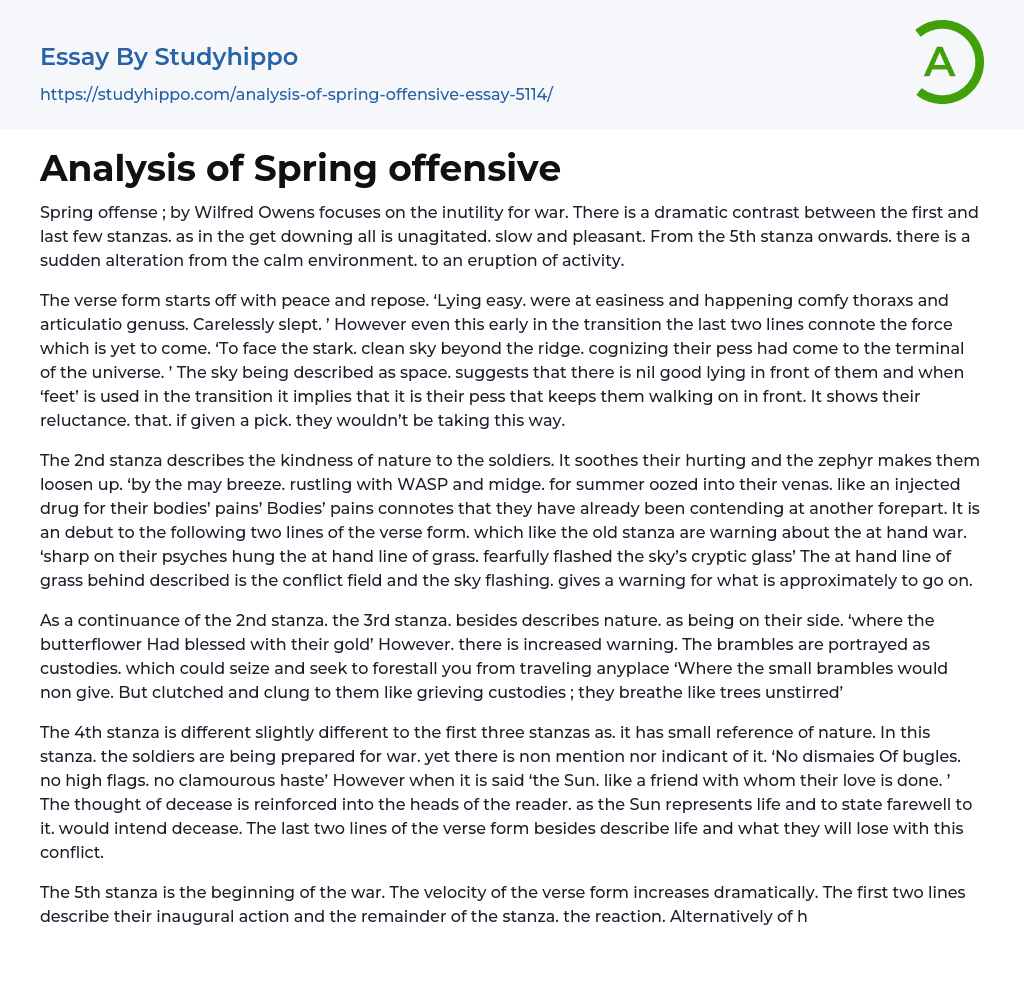In Wilfred Owen's "Spring Offense," the theme of war's futility is emphasized through a stark contrast between the tranquil beginning and the sudden eruption of activity later on. The poem initially portrays a peaceful and serene landscape, where soldiers lay comfortably and slept carelessly. However, even in this calm state, the final two lines suggest an impending violence yet to come. The description of the sky as "stark" and "clean" implies that there is nothing promising ahead, and the mention of their "feet" indicates their reluctance to continue on this path. The second stanza depicts nature's kindness towards the soldiers, offering them solace and relaxation through the gentle breeze and sounds of insects. This is followed by a reference to their bodies' pains, implying prior battles they have endured. This serves as a precursor to the
... upcoming war, as signaled by the mention of the impending danger hanging over their minds like a sharp line of grass.The sky's cryptic glass fearfully flashed, giving a warning of the impending conflict. The line of grass behind described the battleground. Continuing from the second stanza, the third stanza also portrayed nature as being on their side. The butterflowers blessed with their golden presence, but there was an increased warning. The brambles were like hands that clung and prevented movement. They remained unmoving like trees.
The fourth stanza was slightly different as it focused on the soldiers being prepared for war, without explicitly mentioning it. There were no bugle calls, high flags, or rushing movements. However, the mention of the Sun as a loved one reinforced the idea of death. The last two lines described the loss of lif
with this conflict.
In the fifth stanza, the war began. The pace of the poem dramatically increased. The first two lines described their initial action, while the rest of the stanza depicted the reaction. Instead of encountering direct opposition, they faced something else.Owen has depicted the soldiers' struggle through nature. All the elements created by the war are portrayed as natural phenomena. For example, the phrase "And immediately the whole sky burned With rage once more them" is used to describe the sudden detonation of bombs, emphasizing the intensity of the conflict. By using nature to depict the combat and its consequences, it amplifies the opposition and hopelessness of the conflict, creating a feeling of everything being against them.
The line "Earth set sudden cups In 1000s for their blood" suggests that the entire world wanted their blood shed on the land, indicating the death of many soldiers. "Chasmed and steepened sheer to infinite space" connotes that the Earth split open and swallowed everyone with it, effectively symbolizing death. The last stanza serves as a conclusion to the event, where the poet expresses more disapproval for war.
Continuing from the previous stanza, the poet informs us about the destructive nature of war, cleverly portraying the environment as an enemy. However, unlike before, there are very few soldiers left standing and fighting. "Of them who running on that last high point Leapt to swift unobserved bullets or went up On the hot blast and rage of hell's rush or plunged and fell off past this world's brink."'After all, many of those who were left ended up being killed in the array of slugs and bomb blasts. There is
a lot of sarcasm in this stanza of the poem. 'Some say God caught them even before they fell.' The word that stands out is 'some.' It suggests that perhaps God didn't catch them, and they also died, only to end up in hell, just like those who managed to survive. The poet explains that those who remained were monstrous to their enemy, determined to win the war. 'With superhuman inhumanities.' By using these phrases, the poet highlights the extreme acts committed by the men, as they are described as inhumanities instead of inhumane acts. The last four lines of the poem convey the poet's thoughts on war. Their struggle is described as having 'immemorial shames,' indicating that the war was pointless and the victory empty. This idea is further emphasized by the final line of the poem, 'why do they not speak of companions who perished?' This suggests that the survivors of the war did not discuss their fallen comrades and implies that it would have only caused pain and reinforce the notion that war is pointless. The poem has been written with style. Although nature is used as a contrast to exaggerate the impact of war, it is very effective in the poem. Owen has successfully conveyed his view on peace and the absurdity of war.'
- Book Summary essays
- Metaphor essays
- Reader essays
- Rhyme essays
- Literary devices essays
- Villain essays
- Books essays
- Genre essays
- Literary Criticism essays
- Writer essays
- Protagonist essays
- Simile essays
- Poem essays
- Book Report essays
- Book Review essays
- Greek Mythology essays
- Plot essays
- Tragic Hero essays
- Coming of Age essays
- Play essays
- Rhetoric essays
- Rhetorical Question essays
- Translation essays
- Understanding essays
- Reason essays
- Character essays
- Letter essays
- American Literature essays
- Literature Review essays
- Utopia essays
- Poetry Analysis essays
- Dante's Inferno essays
- Between The World and Me essays
- Incidents in The Life of a Slave Girl essays
- Flowers for Algernon essays
- Myth essays
- Everyday Use essays
- Boo Radley essays
- Genesis essays
- Richard iii essays
- Alice in Wonderland essays
- On the road essays
- Ozymandias essays
- The Nightingale essays
- Holden Caulfield essays
- Animal Farm essays
- 1984 essays
- A Hanging essays
- Shooting An Elephant essays
- A Tale Of Two Cities essays




